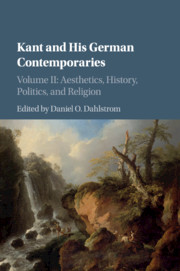73 results
Chapter 12 - Heidegger’s Contradictions
- from Part IV - Logical Principles and the Question of Being
-
-
- Book:
- Heidegger on Logic
- Published online:
- 15 September 2022
- Print publication:
- 22 September 2022, pp 240-258
-
- Chapter
- Export citation
56. - Difference (Unterscheidung)
- from D
-
-
- Book:
- The Cambridge Heidegger Lexicon
- Published online:
- 17 April 2021
- Print publication:
- 03 June 2021, pp 227-230
-
- Chapter
- Export citation
Chapter 10 - Cassirer’s Phenomenological Affinities
- from Part III - Cassirer’s Philosophical Method
-
-
- Book:
- Interpreting Cassirer
- Published online:
- 17 April 2021
- Print publication:
- 01 April 2021, pp 193-213
-
- Chapter
- Export citation
Introduction
-
-
- Book:
- Kant and his German Contemporaries
- Published online:
- 21 September 2018
- Print publication:
- 11 October 2018, pp 1-10
-
- Chapter
- Export citation
Acknowledgments
-
- Book:
- Kant and his German Contemporaries
- Published online:
- 21 September 2018
- Print publication:
- 11 October 2018, pp ix-ix
-
- Chapter
- Export citation
Contributors
-
- Book:
- Kant and his German Contemporaries
- Published online:
- 21 September 2018
- Print publication:
- 11 October 2018, pp vii-viii
-
- Chapter
- Export citation
Part I - Aesthetic Perspectives
-
- Book:
- Kant and his German Contemporaries
- Published online:
- 21 September 2018
- Print publication:
- 11 October 2018, pp 11-68
-
- Chapter
- Export citation
Index
-
- Book:
- Kant and his German Contemporaries
- Published online:
- 21 September 2018
- Print publication:
- 11 October 2018, pp 276-286
-
- Chapter
- Export citation
Copyright page
-
- Book:
- Kant and his German Contemporaries
- Published online:
- 21 September 2018
- Print publication:
- 11 October 2018, pp iv-iv
-
- Chapter
- Export citation
Bibliography
-
- Book:
- Kant and his German Contemporaries
- Published online:
- 21 September 2018
- Print publication:
- 11 October 2018, pp 257-275
-
- Chapter
- Export citation
Part III - Political Perspectives
-
- Book:
- Kant and his German Contemporaries
- Published online:
- 21 September 2018
- Print publication:
- 11 October 2018, pp 129-192
-
- Chapter
- Export citation
Chapter 12 - Reason within the Limits of Religion Alone
- from Part IV - Religious Perspectives
-
-
- Book:
- Kant and his German Contemporaries
- Published online:
- 21 September 2018
- Print publication:
- 11 October 2018, pp 238-256
-
- Chapter
- Export citation
Part II - Historical Perspectives
-
- Book:
- Kant and his German Contemporaries
- Published online:
- 21 September 2018
- Print publication:
- 11 October 2018, pp 69-128
-
- Chapter
- Export citation
Abbreviations
-
- Book:
- Kant and his German Contemporaries
- Published online:
- 21 September 2018
- Print publication:
- 11 October 2018, pp x-xii
-
- Chapter
- Export citation
Part IV - Religious Perspectives
-
- Book:
- Kant and his German Contemporaries
- Published online:
- 21 September 2018
- Print publication:
- 11 October 2018, pp 193-256
-
- Chapter
- Export citation
Contents
-
- Book:
- Kant and his German Contemporaries
- Published online:
- 21 September 2018
- Print publication:
- 11 October 2018, pp v-vi
-
- Chapter
- Export citation

Kant and his German Contemporaries
-
- Published online:
- 21 September 2018
- Print publication:
- 11 October 2018
5 - The Aesthetic Holism of Hamann, Herder, and Schiller
-
-
- Book:
- The Cambridge Companion to German Idealism
- Published online:
- 30 August 2017
- Print publication:
- 11 August 2017, pp 106-127
-
- Chapter
- Export citation
Chapter 12 - Natorp’s psychology
- from Part III - The theory of knowledge
-
-
- Book:
- New Approaches to Neo-Kantianism
- Published online:
- 05 June 2015
- Print publication:
- 11 June 2015, pp 240-260
-
- Chapter
- Export citation
6 - Heidegger and the impact of idealism
-
-
- Book:
- The Impact of Idealism
- Published online:
- 05 December 2013
- Print publication:
- 21 November 2013, pp 225-245
-
- Chapter
- Export citation



